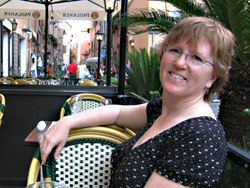Back in 2000, a writer for Salon complained about the flood of “Best of” year-endanthologies, reserving especially harsh words for the “Best New AmericanVoices” series, which collects submissions from 116 workshops, writing programs, and the like.
“This seems sweet but is surely destined for retail failure,” wrote JoAnn Gutin. “Who, beyond the relatives of the anthologized, is the audience for such a book?”
Ouch. As it turns out, there is an audience; Gutin’s argument for “more filtration, not less” ignored the fact that people, invariably drawn to books with the word “Best” on the cover, have a variety of interests. And even if the only ones picking up the book were writers in workshops, treating the text like a survey of the most popular kids in class, the anthology would by now have a substantial audience.
Included in this year’s collection is Alice Marshall, a graduate of the University of Washington’s MFA program. Her story, “By Any Other Name,” chronicles an emotionally distant man who tends to his neighbor’s rose garden while she undergoes chemotherapy. Marshall may not be the stereotypical “emerging writer.” For starters, she’s 45. (“Everyone else was in their 20s,” she says of her classmates.) Professionally, she’s also a bit of an oddball: Despite her degree in information systems management from the University of San Francisco, she’s been working as a “concept engineer consultant” in customer service at a fabric store.
But she had been writing for her entire life, and for seven years before her enrollment had met with a weekly writing group. “After my husband went to seminary, I said, ‘This is my time,'” says Marshall. She wanted more critical eyes to view her work, applied to MFA programs, and now credits the degree with bumping her writing up a level, from “Macy’s to Nordstrom’s. It felt like the difference between being a hobbyist and being a writer.” But it’s not quite a vocation yet. Of all UW MFA graduates, only one—David Guterson—is actually making his living as a full-time writer, according to a recent essay by Peter Mountford, a classmate of Marshall’s at UW. (Mountford, incidentally, has a short story forthcoming in next year’s “Best New Voices.”)
Marshall may be one of the statistical outliers in the anthology. But her story, which is sweetly told and quite well polished, is far from unfiltered. MFA students are prone to producing formulaic stuff, eclectic workshop methods be damned. Those lessons take some time to forget, which may make “Best New Voices” one of the more filtered best-of books.
Even Marshall admits, “For a while, all people coming out of Iowa were starting to sound the same. There’s the same techniques that are used over and over: being dropped into the middle of the story to begin with, move forward with a little action, and then the backward reflection for two or three scenes. And then, resume the forward action. And then, the ending is an epiphany followed by a wry image.” Yes, that sounds like a formula for a good short story, one that all writers should immediately forget.
Karla Starr









